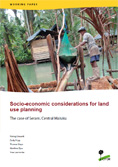
Background and objectives
Environmental degradation and forest loss are increasing world wide, with the most immediate impact occurring at the local level in tropical countries. The loss of ecological services provided by tropical forests, together with the reduced availability of renewable resources, is particularly important to people who rely on natural resources for their livelihood. A new approach to conservation and to mitigation of environment degradation, still in its experimental phase, is to include payments and pro-poor markets for environmental services (PES) into land-use planning processes.
The design of any land-use planning (LUP) or natural resource management (NRM) action, including Reducing Emissions from Deforestation and forest Degradation (REDD) activities, should look for improvements to land tenure arrangements (land allocation in LUP) to support its development goals. Mediated negotiations on land allocation with stakeholders is crucial. It will lead to new institutional arrangements among different levels of government, local communities and the private sector, avoiding discrimination against women, minorities and other vulnerable groups. Without a proper understanding of land tenure issues, attempts to promote pro-poor financing mechanisms (e.g. PES, REDD and micro credits) will likely be jeopardized or fail.
A participatory development approach provides stakeholders with organizational arrangements that allow them to coordinate and jointly decide on collective actions. To facilitate this approach in Indonesia, the Collaborative Land Use Planning and Sustainable Arrangement project (CoLUPSIA) was initiated. The main objective is “to establish more collaborative and equitable land-use planning process, leading to the design and testing of new institutional arrangements, environmental policies and pro-poor financing instruments based on more secure land tenure and community rights”. The project’s specific objectives (components) are to:
- improve the capacity of stakeholders to collectively design participatory development actions, including agreements on land tenure and rights, NRM instruments and policies;
- establish collaborative assessments of land conditions, current management and possible future trajectories;
- design mutually agreed-upon land allocation, legal Collaborative Land-use Planning (CLUP)/NRM plans and participatory development actions;
- initiate and evaluate specific pilot activities supporting pro-poor financing mechanisms for forest conservation and sustainable management of resources;
- raise public awareness on CLUP and ecosystem services value.








